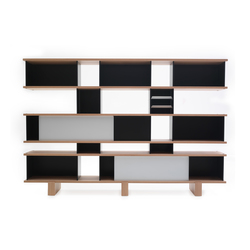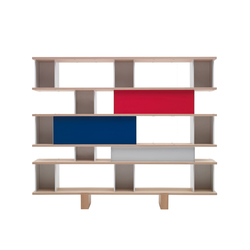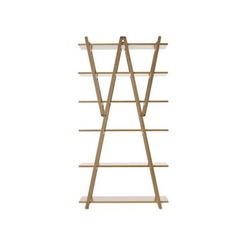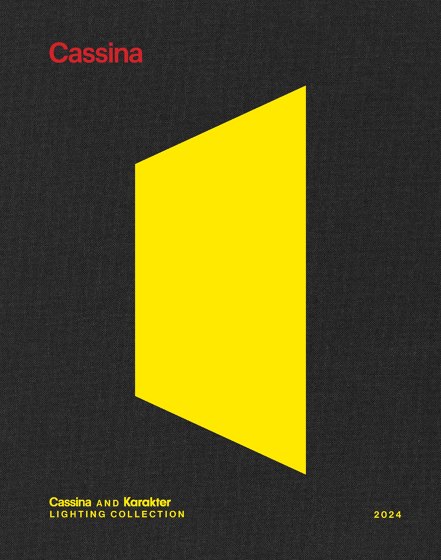526 Nuage Bibliothèque Black
Shelving from Cassina, Designed by Charlotte Perriand
Product description
Concept
State-of-the-art modularity: Nuage, a family of bookshelves and cupboards.
Renowned for her groundbreaking furnishing designs, Charlotte Perriand never stopped studying and thinking about cupboards and bookshelves throughout her long career as an architect. Half way through the 1950s, she started working on Nuage, a family of bookshelves and cupboards that Cassina is exclusively reproducing today, for the first time, for the Cassina I Maestri Collection.
A collector’s item rediscovered by Cassina and now available to everyone.
Various models from the Nuage project were first edited by Galérie Steph Simon, the legendary Parisian gallery where many innovative pieces that gave rise to the birth of modern design were first exhibited. Today Cassina produces all of the models studied by Charlotte Perriand, unique pieces produced in the past, including both cupboards and bookshelves. An operation that highlights the culture of design, aimed at the authentic reconstruction of a new way of producing and thinking about furniture, working as always in close collaboration with Pernette Perriand-Barsac, Charlotte Perriand’s daughter and sole heir. Like many of Charlotte Perriand’s projects, the Nuage bookcases and sideboards are part of important design collections in Europe, USA and Japan.
Free modularity inspired by Japanese architecture, with ever different effects of movement.
The key language of modern design, modularity, in Charlotte Perriand’s vision, is never rigid or aseptic, but always combines functionality and aesthetics to fully meet the user’s requirements. These bookcases are the result of research which started in 1928 on standardised metallic containers when Charlotte Perriand, in collaboration with Le Corbusier and Pierre Jeanneret, developed the ‘équipement intérieur de l’habitation’ or rather interior living equipment for the 1929 Salon d’Automne Exhibition. But the turning point was during the time that Charlotte Perriand lived in Japan from 1940 to 1941. Perriand highlights the wealth of compositions available from the assembly of elements normalised on a human scale and standardised, typical of traditional Japanese architecture. “In Kyoto, in the Katsura imperial villa built in the XVII century”, Perriand herself recalls, “I noted some shelves arranged on the walls, in the form of a cloud. This is where my cloud shape (bookshelves) came from, with aluminium connecting elements. A free form that gives rhythm to space and enhances the objects it supports”. These bookshelves, which give their name to the finished project developed later, carry the concept of free modularity to its extreme. They are asymmetrically silhouetted against the wall, leaving empty spaces for paintings, drawings or sculptures. Strongly graphic and functional, they give a unique character to the interiors.
Intelligent simplicity: a play of form and coloured geometries that meet the differing requirements of space and emotion.
Following her second stay in Japan between 1953 and 1954, Charlotte Perriand devotes her studies to the standardisation of all components necessary to create the bookshelves and cupboards. Perriand baptised her inventions in a deliberately provocative way “nouvelle quincaillerie”- that is new hardware, a set of elements that can be combined: metal supports, wooden shelves, metallic space blocks, sliding panels, trays, etc., which could be assembled together. “Starting from these elements,” she wrote, “I could freely create entire walls or reduced combinations, or even furniture.” Her compositions go from sideboards and cupboards to bookshelves, with ground support or hung following symmetrical and asymmetrical plans, or even free-standing bookcases capable of structuring the architecture of a space. The basic components are the wooden oak shelves and vertical elements in aluminium which has been anodised or painted black. Five different heights studied in order to best organise various formats of objects and books. Each composition can be embellished with accessories such as aluminium trays and black, red and yellow plastic sliding trays which are functional and removable. The sliding panels of the bookcases can be in anodised aluminium, or in red, blue, green, yellow, grey, black and white.
Range:
NUAGE Bahuts (sideboards),
NUAGE Rangements (cupboards),
NUAGE Bibliothèques épis,
NUAGE Bibliothèques murales,
NUAGE Bibliothèques asymétriques (bookcases).
Renowned for her groundbreaking furnishing designs, Charlotte Perriand never stopped studying and thinking about cupboards and bookshelves throughout her long career as an architect. Half way through the 1950s, she started working on Nuage, a family of bookshelves and cupboards that Cassina is exclusively reproducing today, for the first time, for the Cassina I Maestri Collection.
A collector’s item rediscovered by Cassina and now available to everyone.
Various models from the Nuage project were first edited by Galérie Steph Simon, the legendary Parisian gallery where many innovative pieces that gave rise to the birth of modern design were first exhibited. Today Cassina produces all of the models studied by Charlotte Perriand, unique pieces produced in the past, including both cupboards and bookshelves. An operation that highlights the culture of design, aimed at the authentic reconstruction of a new way of producing and thinking about furniture, working as always in close collaboration with Pernette Perriand-Barsac, Charlotte Perriand’s daughter and sole heir. Like many of Charlotte Perriand’s projects, the Nuage bookcases and sideboards are part of important design collections in Europe, USA and Japan.
Free modularity inspired by Japanese architecture, with ever different effects of movement.
The key language of modern design, modularity, in Charlotte Perriand’s vision, is never rigid or aseptic, but always combines functionality and aesthetics to fully meet the user’s requirements. These bookcases are the result of research which started in 1928 on standardised metallic containers when Charlotte Perriand, in collaboration with Le Corbusier and Pierre Jeanneret, developed the ‘équipement intérieur de l’habitation’ or rather interior living equipment for the 1929 Salon d’Automne Exhibition. But the turning point was during the time that Charlotte Perriand lived in Japan from 1940 to 1941. Perriand highlights the wealth of compositions available from the assembly of elements normalised on a human scale and standardised, typical of traditional Japanese architecture. “In Kyoto, in the Katsura imperial villa built in the XVII century”, Perriand herself recalls, “I noted some shelves arranged on the walls, in the form of a cloud. This is where my cloud shape (bookshelves) came from, with aluminium connecting elements. A free form that gives rhythm to space and enhances the objects it supports”. These bookshelves, which give their name to the finished project developed later, carry the concept of free modularity to its extreme. They are asymmetrically silhouetted against the wall, leaving empty spaces for paintings, drawings or sculptures. Strongly graphic and functional, they give a unique character to the interiors.
Intelligent simplicity: a play of form and coloured geometries that meet the differing requirements of space and emotion.
Following her second stay in Japan between 1953 and 1954, Charlotte Perriand devotes her studies to the standardisation of all components necessary to create the bookshelves and cupboards. Perriand baptised her inventions in a deliberately provocative way “nouvelle quincaillerie”- that is new hardware, a set of elements that can be combined: metal supports, wooden shelves, metallic space blocks, sliding panels, trays, etc., which could be assembled together. “Starting from these elements,” she wrote, “I could freely create entire walls or reduced combinations, or even furniture.” Her compositions go from sideboards and cupboards to bookshelves, with ground support or hung following symmetrical and asymmetrical plans, or even free-standing bookcases capable of structuring the architecture of a space. The basic components are the wooden oak shelves and vertical elements in aluminium which has been anodised or painted black. Five different heights studied in order to best organise various formats of objects and books. Each composition can be embellished with accessories such as aluminium trays and black, red and yellow plastic sliding trays which are functional and removable. The sliding panels of the bookcases can be in anodised aluminium, or in red, blue, green, yellow, grey, black and white.
Range:
NUAGE Bahuts (sideboards),
NUAGE Rangements (cupboards),
NUAGE Bibliothèques épis,
NUAGE Bibliothèques murales,
NUAGE Bibliothèques asymétriques (bookcases).
More about this product
Categorised in Storage - Shelving - Shelving systems - open base - free-standing - with sliding doors - Wood - Structure solid wood - Structure engineered wood - Residential.
Part of the collection
CABINETS AND BOOKCASES.
Manufacturer
Cassina
Family
Nuage
Architonic ID
1170459
Year of Launch
2012
More products from Nuage family
Downloads
Manufacturer’s Catalogues
Contact information
Address
Via Luigi Busnelli 1, 20036 Meda (Mi) Italy
Get more information
Sign in to your Architonic account to have your contact details filled out automatically for each request.
Where to buy this product

More from
CassinaContact information
Address
Via Luigi Busnelli 1, 20036 Meda (Mi) Italy
Where to buy this product



